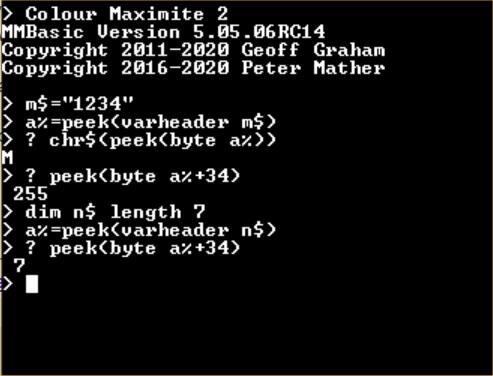
|

|
Forum Index : Microcontroller and PC projects : CMM2: any chance of some 'love' for string arrays ?
| Author | Message | ||||
| thwill Guru Joined: 16/09/2019 Location: United KingdomPosts: 4344 |
Hi folks (and I will pretend someone other than Peter can help), Unless I'm much mistaken MATH SET and MATH SLICE only work with numerical arrays (the clue is in the name) and there are no MEMORY SET/COPY variants specifically for working with STRINGs. In theory the raw MEMORY SET/COPY could be used but I think we are missing a way to get a crucial piece of information that would allow them to be used generally to manipulate string arrays, that is a way to retrieve the LENGTH used in the declaration of the string array. Can anything be done about this (or can someone tell me how to PEEK this information). And rather more specialised is there any chance of SORT getting a couple of additional parameters so we can just sort part of an array ? I know it's a strange request but I have a reputation to keep up ;-) My particular use-case is using a string array to store a sorted map where I am storing both keys (in the first half) and values (in the second half) of a single array. I could of course use a 2D array, but then I can't use SORT at all. Best wishes, Tom MMBasic for Linux, Game*Mite, CMM2 Welcome Tape, Creaky old text adventures |
||||
| matherp Guru Joined: 11/12/2012 Location: United KingdomPosts: 10965 |
If you download V5.05.06RC14 again then you can try the following  Remember the string has a length byte at the beginning so you need to move 1 byte more than the reported length I don't understand the sort request. Can you not do what you want by using the optional index and having two arrays? struct s_vartbl { // structure of the variable table char name[MAXVARLEN]; // variable's name char type; // its type (T_NUM, T_INT or T_STR) char level; // its subroutine or function level (used to track local variables) unsigned char size; // the number of chars to allocate for each element in a string array char dummy; int __attribute__ ((aligned (4))) dims[MAXDIM]; // the dimensions. it is an array if the first dimension is NOT zero union u_val{ MMFLOAT f; // the value if it is a float long long int i; // the value if it is an integer MMFLOAT *fa; // pointer to the allocated memory if it is an array of floats long long int *ia; // pointer to the allocated memory if it is an array of integers char *s; // pointer to the allocated memory if it is a string } } Edited 2020-11-07 21:06 by matherp |
||||
| thwill Guru Joined: 16/09/2019 Location: United KingdomPosts: 4344 |
Thanks Peter, PEEK(VARHEADER ...) should let me do what I want. Forget about the SORT request. For what it is worth I'm writing the code to support the following: Dim my_map$(map.new%(20)) map.init(my_map$()) map.put(my_map$(), "foo", "bar") map.put(my_map$(), "wom", "bat") map.put(my_map$(), "aaa", "bbb") Print map.size%(my_map$()) Print map.get$(my_map$()) Print map.get$(my_map$()) Print map.get$(my_map$()) Where 'map' is a sorted map implementation using half of the array for the keys, half for the values and the final element for the size. This allows the caller to treat my_map$() as a single variable, not separate keys, values and size. Tom Edited 2020-11-07 21:47 by thwill MMBasic for Linux, Game*Mite, CMM2 Welcome Tape, Creaky old text adventures |
||||
| The Back Shed's forum code is written, and hosted, in Australia. | © JAQ Software 2026 |